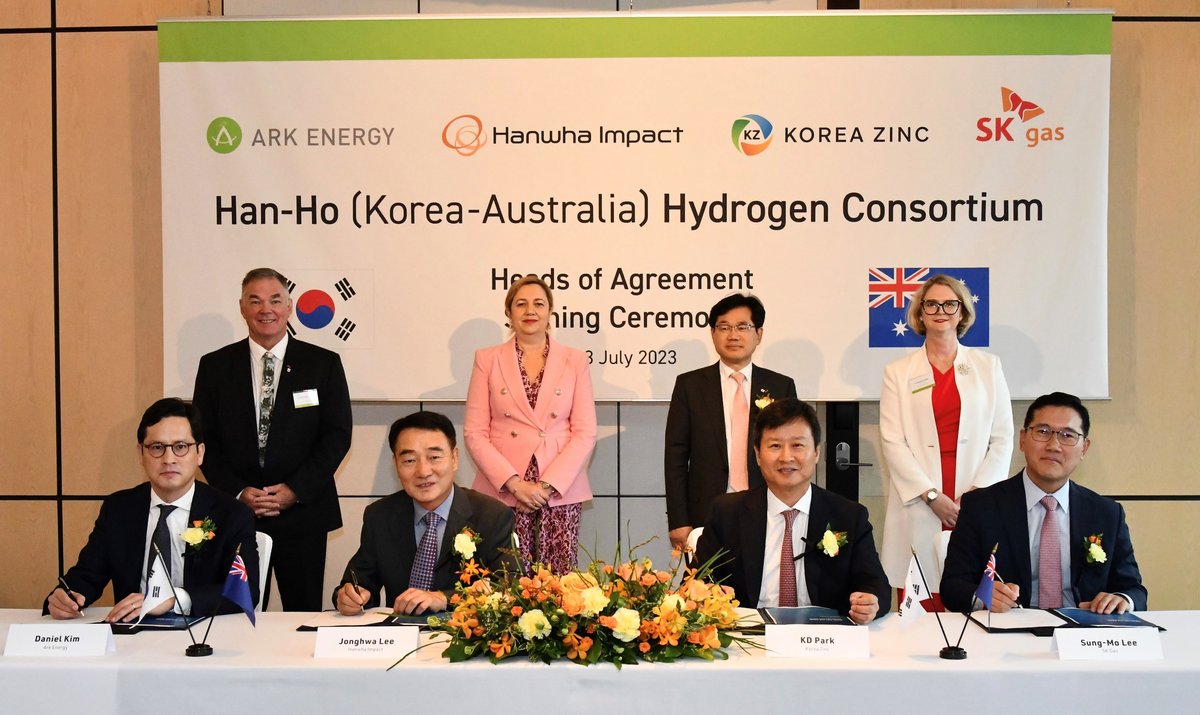Han-Ho H2 Hub progresses to feasibility stage
Han-Ho H2 consortium announces decision to progress export scale green hydrogen project to feasibility stage
The Hanguk-Hoju (Korea-Australia) Hydrogen (Han-Ho H2) consortium involving three of Korea’s largest conglomerate groups, Korea Zinc, Hanwha Impact and SK Gas, and Australian-based Ark Energy have held a Heads of Agreement (HoA) signing event in Seoul today and announced their decision to progress the Han-Ho H2 Hub (the Project) to feasibility stage.
The Project seeks to build a green energy supply chain exporting up to 1.8 million tonnes of green ammonia per annum from Australia to the Republic of Korea (ROK) by 2030.
The HoA signing event was witnessed by Young-ghil Cheon, Deputy Minister for Energy Policy, Ministry of Trade, Industry and Energy, ROK and The Hon. Annastacia Palaszczuk MP, Premier of Queensland and Minister for the Olympic and Paralympic Games as part of her trade mission to Korea.
Premier Palaszczuk said her government’s vision for hydrogen goes beyond decarbonising our existing industries and exporting from Gladstone.
“Our Queensland Energy and Jobs Plan also sets out the framework for North Queensland to be a hydrogen and critical minerals export powerhouse. To support this, the Queensland Government will invest $8.5 million in the Abbot Point Hydrogen Activation Initiative.
“This investment will advance the master planning, development and infrastructure arrangements that are needed for Abbot Point to become a hydrogen export hub. The investment will also support planning for the water and power supplies needed to produce hydrogen at scale in North Queensland,” the Premier said.
Speaking on behalf of the Han-Ho H2 consortium, Daniel Kim, CEO of Ark Energy welcomed Premier Palaszczuk’s announcement.
“Since launching the consortium in September last year, we have worked closely with our partners to complete the concept stage of our Han-Ho H2 Hub. We are delighted to upgrade our relationship with the HoA and look forward to progressing the Project to feasibility stage.
“We believe North Queensland has the potential to become a world class producer and exporter of green hydrogen. The Port of Abbot Point is a strategically located, deep-water port capable of supporting the scale required for a hydrogen export industry.
“We are committed to working closely with all of our key stakeholders to unlock and maximise this potential, build a new green energy supply chain from Australia to Korea and deliver prosperity to the regional communities in which we operate,” Mr Kim said.
Pursuant to the HoA, the Han-Ho H2 consortium has agreed to target completion of the Han-Ho H2 Hub feasibility study by March 2024.

Queensland Premier Annastacia Palaszczuk MP witnesses the HoA signing in Seoul by signatories for (L-R) Ark Energy, Hanwha Impact, Korea Zinc and SK Gas.
About Green Ammonia
Green ammonia is produced from green hydrogen, which in turn is produced from renewable energy (including solar and wind) via an electrolysis process. Green ammonia is a critical enabler to decarbonising coal and gas-fired power generation, where it can be used as a zero-carbon fuel as well as in the manufacture of fertilisers and explosives. Ammonia is already a well-established commodity with a mature market. It can be an excellent energy carrier over long distances and transported relatively easily. Green ammonia can be cracked back to hydrogen gas to be used in other applications such as the transport sector.
About Hanwha Impact
Hanwha Impact is a holding company within Hanwha Group of which major business areas include solar power, energy, defence, aerospace and retail. Hanwha Impact’s core mission is to accelerate the Group’s transition to carbon neutrality. Hanwha Impact will lead a sustainable future for the world and humanity through its transition into an eco-friendly energy and carbon-neutral company, breaking conventional frames and investing in future technologies. As an example of its investment in hydrogen economy, Hanwha Impact acquired two hydrogen combustion technology companies PSM and Thomassen Energy in 2021. Hanwha Impact
About Korea Zinc
Korea Zinc Co. Ltd. is the largest and most environmentally friendly zinc producer in the world. Korea Zinc is listed on the Korea Composite Stock Price Index (KOSPI) with a market capitalisation of approximately A$13billion. Korea Zinc has a proud 25-year history in Australia through its Sun Metals zinc refinery in Townsville, which is the largest private sector employer in North Queensland. Korea Zinc was the first major refiner in the world to join RE100 and commit to powering its global operations from 100% clean energy by 2050. Korea Zinc’s future growth strategy is underpinned by its Troika Drive focussed on Renewable Energy and Green Hydrogen, Secondary Battery Materials and Resource Recycling. Korea Zinc
About SK Gas
SK Gas has the vision to become the Net Zero Solution Provider for customers by providing low carbon solution of LNG and LPG as well as zero carbon solution of clean hydrogen and ammonia. SK Gas is the no.1 player in the Korean LPG market and is the leader in LPG global trading. Recently SK Gas has expanded its portfolio to LNG by building a LNG terminal, LNG/LPG dual fuel power plant and LNG marketing business. The LNG terminal and power plant are expected to be operational from 2024. SK Gas plans to leverage its LNG/LPG assets and capabilities to grow a successful clean hydrogen and ammonia business targeting power generation, industrial and mobility sectors. SK Gas
